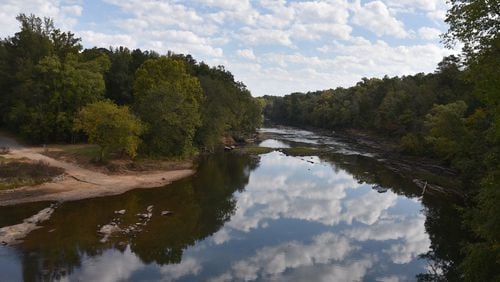Fresh off a key legal victory in the decades-long water war with Florida, Georgia leaders are scrambling to shore up glaring weaknesses exposed by the litigation while bracing for a new fight in Congress that could undercut the state’s courtroom success.
A judicial official in February urged the U.S. Supreme Court to reject strict new water consumption limits that Georgia said would have devastated the state’s economy, but his findings also highlighted vast problems with the state’s agricultural water use that could dog the state in future court battles.
At the same time, Georgia’s congressional delegation is on guard for another attempt by federal lawmakers from Alabama and Florida to weaken the state’s position. And they are readying for the possibility that the high court ignores the judicial recommendation or calls for a new round of litigation.
For state officials who have already spent roughly $30 million on the litigation, the fight is far from over.
"We've won one skirmish," said Gerald Long, president of the Georgia Farm Bureau. "There are many, many battles ahead of us. So we've got to be vigilant."
‘Unrestrained’ water use
It was a big skirmish. Ralph Lancaster, a Maine attorney appointed by the U.S. Supreme Court as a special master to handle the case, found in February that Florida had "failed to show that a consumption cap" was needed after five weeks of hearing testimony in the case.
But his 70-page report found problems with Georgia’s agricultural water use, in part after Florida shifted the focus of its argument away from metro Atlanta’s consumption and toward that of farmers in the southern part of the state.
Lancaster concluded that Georgia’s agricultural water use was “largely unrestrained” and cited Florida’s count that the amount of irrigated acreage in Georgia ballooned from 75,000 acres in 1970 to more than 825,000 acres in 2014.
“In the face of this sharp increase in water use, Georgia has taken few measures to limit consumptive water use for agricultural irrigation,” he wrote, adding that agriculture permits issued by the state often don’t limit the amount of irrigation that can be used by farmers.
Lancaster also criticized the state Environmental Protection Division for refusing to declare a drought in 2011 despite ample warnings, finding that Georgia officials were “clearly not wishing to incur the cost of preventative action.”
‘There’s work to be done’
As drought squeezed the state’s water supply, he said, the state issued only a temporary moratorium on new irrigation permits to South Georgia farmers.
“Georgia’s position — practically, politically, and legally — can be summarized as follows: Georgia’s agricultural water use should be subject to no limitations, regardless of the long-term consequences” for the river basin, he wrote.
Gov. Nathan Deal and other state officials have taken notice. Deal said in a recent interview that “internal work” is needed to fortify the state’s weaknesses, including new ways to measure agricultural water use.
“We have continued to try to press to get more of the irrigated land metered so we have a better idea of the volume of usage,” Deal said. “That’s one of our better mechanisms of defense. We need to prove with actual numbers what the amount of water is that’s being consumed.”
He said Florida “just picked numbers, I think out of air” to report how much water was being used by Georgia for agricultural purposes and claim the state has 100,000 acres of irrigated land with no meters. And Georgia couldn’t effectively counter, he said, because “unfortunately, we don’t totally know.”
“There’s work to be done. It’s a sensitive issue,” Deal said. “It’s a property rights issue in the eyes of many people. So we have to work with the agricultural community to find what best fits Georgia’s situation.”
Georgia agriculture leaders are starting the behind-the-scenes work now.
“We’ve got to be responsible as farmers on metering so we can continue to prove not only to Florida but to the rest of the nation and federal agencies that we are trying to conserve water and we’re doing our part,” said Long, the head of the Farm Bureau.
‘Legislative gymnastics’
The state is also hunkering down for a new round of intrigue in Congress. Deal dispatched his top aide, Chris Riley, to Washington last week to brief the congressional delegation on water policy. The message: The state needs to be prepared for a legislative assault.
It wouldn’t be the first time. There are perennial attempts by Georgia’s neighbors to target the state’s water policy, most recently a directive initially tucked into a wide-ranging $10 billion water bill that tells the governors of Georgia, Alabama and Florida to negotiate a settlement or risk Congress’ intervention.
Georgia’s contingent in Washington united to erase the directive, making a case that Congress should have no role in the water dispute, and the law passed late last year without the provision. Still, for many lawmakers it was a reminder to stay vigilant.
“The Georgia delegation is well aware of the kinds of legislative gymnastics that our Alabama and Florida neighbors employ in hopes of gaining ground in the water dispute,” said U.S. Rep. Doug Collins, R-Gainesville.
He and others are quick to point to Lancaster’s finding, which came after years of litigation and decades of fighting between the states.
Georgia's two neighbors have long argued that the Peach State has drawn more than its share from the Chattahoochee and Flint rivers, posing a threat to the ecological system and harming the livelihoods of their residents.
Georgia countered that the state's water use had little to do with the collapse of the Apalachicola oyster industry, and Lancaster's finding appeared to vindicate its position.
But it’s not final, as the high court can reject Lancaster’s recommendation, order another round of arguments or take another route. Further lawsuits can’t be ruled out either.
“We have some work to be done,” Deal said. “This isn’t over.”
About the Author








